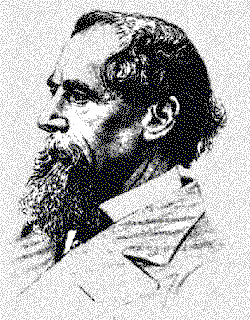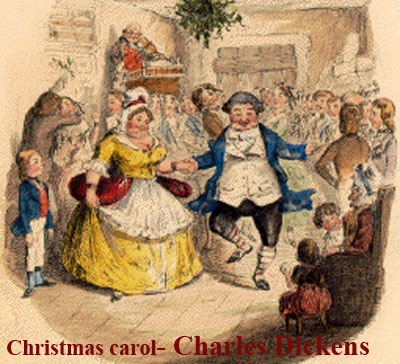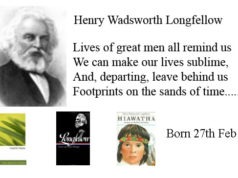
CHARLES DICKENS
(Born – FEBRUARY 7, 1812)
Died – June 9, 1870)
“No words can express the secret agony of my soul…
I felt my early hopes of growing up to be a learned and distinguished man crushed in my breast.”

Charles John Huffham Dickens was born on 7th February 1812, in the English coastal town of Portsmouth, where his father, John Dickens was a clerk in the Navy Pay office. When Charles was born, his father John Dickens was 26 and was an excitable, extravagant man who liked to entertain in style, a style that his meager salary as a clerk was unable to support. This led him into a succession of financial crisis throughout his life.
The second of eight children, Charles was a delicate, sensitive child, unable to join in the play of other children and he withdrew into books. Later in life, recalling his boyhood days, he wrote: “When I think of it, the picture always arises in my mind of a summer evening, the boys at play in the churchyard and I sitting on my bed, reading as if for life.”
As a child, the books Charles Dickens read were Robinson Crusoe, The Arabian Nights, Don Quixote and a child’s Tom Jones and this reading creating for him a world of magic, wonder and adventure, a world that he himself was so vividly to create for others to enjoy in his own books.
At the age of 12, the childhood of Dickens came to a sudden and dramatic end. His father, unable to pay his large debts, was packed off to the Marshalsea Debtors’ Prison in London. Within a few days, the rest of the family were to join him there, except Charles, whose education was cut short and who was made to earn his living, washing bottles at Warren’s Blacking Factory. This experience proved so shocking and humiliating to the boy that it was to haunt him for the rest of his life. “No words can express the secret agony of my soul…I felt my early hopes of growing up to be a learned and distinguished man crushed in my breast.”
Though soon re-united with his family, the previous easy life enjoyed by Charles was never the same. Two years later, at the age of 14, his irregular and inadequate schooling ended and he began work as a clerk in a lawyer’s office in Gray’s Inn, London. This experience, again not a happy one, gave him two things: a lifelong loathing of the legal profession and much raw material for many of his later novels.
Charles then became a reporter on the Parliamentary newspaper’True Sun’, where his natural talent for reporting and keen observation was first recognized. He taught himself shorthand and, on the Mirror of Parliament, and then the Morning Chronicle, he was soon acknowledged as the best Parliamentary Reporter of the age.
In 1833, now very much the young man about town, Charles Dickens wrote his first piece of fiction: A Dinner at Poplar Walk, in the Old Monthly Magazine. Asked by the Editor to contribute more, under the pen name ‘Boz’, Dickens wrote a series of pieces that were collected and published in 1836 under the title Sketches by Boz.
The modest success of Sketches was followed by the enormously popular and successful Pickwick Papers, which was published in a monthly instalments in 1836-37. Pickwick became a national Hero overnight, and his exploits were followed by an average of 40,000 readers. Thought yet not 30, Dickens was now rich and famous.
Two days after the publication of Pickwick, Dickens married Catherine Hogarth, daughter of a fellow Journalist. “So perfect a creature never breathed,” he wrote of her at the time, “She had not a fault.” But with time his view of her was to change, and in later years he was to admit, “She is amiable and complying but nothing on earth would make her understand me.” They were to separate in 1858, when Charles Dickens was 46.
Throughout his life, Charles enjoyed traveling. In the 1840s he journeyed to Scotland, America, France, Switzerland and Italy. And throughout this period, he poured out a succession of novels that exposed the cruelty, hypocrisy and appalling poverty of early Victorian Society, novels such as Oliver Twist, Nicholas Nickleby, The Old Curiosity Shop, Barnaby Rudge, A Christmas Carol, Martin Chuzzlewit, and Dombey and Son.
Even his novel writing (which continued to be published in monthly instalments) proved inadequate for his boundless energy and restless spirit. In the 1840s, apart from all his major novels and work on David Copperfield (published in 1850), he started a dailynewspaper, the Daily News, and a weekly Magazine, Household Words, in addition to writing a travel book American Notes and a three volume Child’s History of England.
In all that he wrote, Charles Dickens strove to draw people together and led them to a better understanding of each other. As he himself believed, “In this world a great deal of bitterness among us arises from an imperfect understanding of one another.”
But as he grew older, the subjects he wrote of grew bleaker and the mood more grim. Bleak House, Hard Times, Little Dorrit, A Taleof Two Cities, Great Expectations, Our Mutual Friend and his unfinished Novel, The Mystery of Edwin Drood, all reflect a growing pessimism.
Despite a steady decline in health, Dickens continued to give dramatic public readings of his works to packed houses in both Britain and the United States, which he visited again in 1867/68. Of these, a contemporary witness reported, “He seemed to be physically transformed as he passed from one character to another; he had as many distinct voices as his books had characters; he held at command the fountains of laughter and tears…When he sat down it was not mere applause that followed, but a passionate outburst of love for the man.”
But the strain proved too much and on 8 June 1870, during a farewell series of talks in England, he suffered a stroke and the next day, Charles Dickens died at his house, ‘Gad’s Hill Place’, near Rochester, Kent, at the age of 58.
Two days after his death, Queen Victoria wrote in her Diary, “Charles Dickens is a very great loss. He had a large loving mind and the strongest sympathy with the poorer classes.” On 14 June, he was buried in the Poet’s corner, Westminster Abbey, close to the monuments of Chaucer and Shakespeare.
{jathumbnail off}







